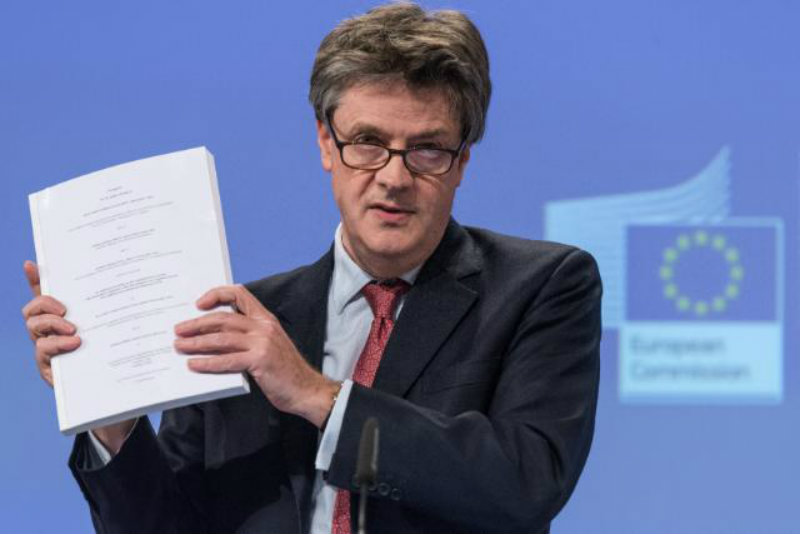European commissioner Jonathan Hill: Statement at the European Parliament on Foreign Currency Loans

Lord Hill’s reply in the European Parliament on 12th May 2016 to oral Question 37/2016 on Foreign Currency Loans:
From: Othmar Karas (EPP), Burkhard Balz (EPP) and Roberto Gualtieri (S&D)
I am grateful for this opportunity to discuss foreign currency loans.
Taking out a mortgage to buy a home is the single biggest financial transaction most people make in their lives. So we need a vibrant and competitive mortgage market, one where people have choice, but also one where they know what they are buying and what risks they are taking on.
One of the products that became popular in recent years were loans made in foreign currencies. For many years they offered consumers low interest rates. But recent experience has shown they can become a problem if they’re offered to households that can’t protect themselves properly against sudden changes in exchange rates. Loans in Swiss francs are a good example. They were popular in countries like Croatia, Poland, Hungary and Romania. But when the Swiss National Bank stopped pegging Swiss francs to the euro in January last year, the cost of servicing them shot up.
This left households struggling to keep up with mortgage repayments, which in turn put pressure on governments to take action to help those in difficulty. Some countries have already passed laws. Others are considering doing so.
What has the Commission done? Well, for the future we have acted to ensure that risks associated with foreign currency loans are better managed by strengthening consumer protection in the Mortgage Credit Directive.
But that does not deal with the problem of existing loans in foreign currencies. Here, we’re working closely with governments that are considering how best to respond. Of course, there is a need to protect the interests of consumers. But we also need to make sure that any measures taken are fully consistent with the single market and that they don’t restrict disproportionately the free movement of capital or the freedom of European companies to do business anywhere in the EU. We also have to consider the potential damage that would be done to investor confidence by undermining legal certainty.
Croatia has chosen to pass legislation that allows borrowers to convert Swiss franc loans into euro denominated loans at an exchange rate that predates the franc’s appreciation. It puts borrowers in the position they would have been in had they chosen a euro denominated loan. But it places the cost of the conversion – a cost that I understand is some 1 billion euros – almost wholly on the shoulders of the banks that issued the loans, without regard to the different circumstances of the borrowers.
We were not consulted on the draft legislation and the Croatian government was under no obligation to do so. Since its adoption, we have assessed whether Croatia’s amendments to its Consumer Credit Act and the Credit Institutions Act are compatible with the principles of the single market. So let me give you our initial analysis.
It’s clear that the goal of protecting borrowers to avoid a debt crisis can justify restrictions to the free movement of capital or the freedom of establishment. But in our view, allowing borrowers to exchange their loans from Swiss francs into euros at an artificially low exchange rate, and placing the cost almost exclusively on lenders, goes beyond what is needed to avoid a crisis and protect borrowers. There’s a problem that needs tackling, that’s clear. So we need to find a proportionate solution in line with Treaty freedoms, one that helps maintain investor confidence in Croatia.
The issue has been discussed at the ECOFIN Council. We’re monitoring the situation carefully in Croatia, but also in other countries that are considering passing legislation. We are keeping all options open including, of course, beginning an infringement procedure if necessary. We’re in close contact with the Croatian government, who tell us they’re keen to find a way forward, and that they’re talking to the banks concerned to find a more balanced approach; that shares the burden of adjustment more fairly. I support that approach but clearly there must be progress soon or we will have to take appropriate action. We need a solution that strikes the right balance, that’s consistent with EU legislation, and that protects consumers, investment and the single market. That’s the solution I’ll continue to push for and that’s what I want to see in every Member State where this is a matter of concern.
Source: Jonathan Hill announcement
Comentarii
Nu există comentarii pentru această știre.
Adauga un comentariu
Alte stiri din categoria: ENGLISH
Neutral interest rate in Romania
The neutral nominal rate in Romania has been falling since the start of inflation targeting in 2005. The Taylor Rule clearly shows that interest rates peaked in 2022 and have been on a clear downward path ever since.Furthermore, the model estimates a long-term neutral nominal rate of around 3.9%, which is the equivalent of approx. 1.4% real.Using a more sophisticated model (i.e. New York FED’S HLW model), the real neutral interest rate in Romania is estimated currently at around 1.5% (1.7% 2023 average) and the historical mean at 1.2%.This implies a neutral nominal rate between 4.00% and 4.50%. In the past decade, the NBR real effective rate was below the neutral rate and only over the past year climbed above the neutral mark.Source: Erste Bank
Merger of Alpha Bank and UniCredit Bank Romania
Press Release:"Alpha Services and Holdings announces a strategic partnership with UniCredit in RomaniaMerger of Alpha Bank Romania and UniCredit Bank Romania and creation of third largest bank in Romania by... detalii
National Bank of Romania (NBR) Board decisions on monetary policy
NBR Board decisions on monetary policyIn its meeting of 4 April 2023, the Board of the National Bank of Romania decided:• to keep the monetary policy rate at 7.00 percent per annum;• to leave unchanged the lending (Lombard) facility rate at 8.00 percent per annum and the deposit facility rate at 6.00 percent per annum;• to keep the existing levels of minimum reserve requirement ratios on both leu- and foreign currency-denominated liabilities of credit institutions.The annual inflation rate went down to 15.52 percent in February 2023, from 16.37 percent in December 2022, relatively in line with forecasts. The decrease was mainly driven by the sizeable drop in the dynamics of fuel and electricity prices, under the impact of significant base effects and the change made to the energy price capping and compensation scheme starting 1... detalii
ING posts 2022 net result of €3,674 million, dividend of €0.389 per share
ING press release:ING posts FY2022 net result of €3,674 million,proposed final 2022 dividend of €0.389 per share 4Q2022 profit before tax of €1,711 million; CET1 ratio remains strong at 14.5%•Profit before tax up 29% on 4Q2021 and 24% on 3Q2022, mainly driven by higher income•Higher net interest income, as a further increase in liability margins helped offset TLTRO impact this quarter•Risk costs declined to 17 bps of average customer lending Full-year 2022 net result of €3,674 million, supported by growing customer base and increase in lending and deposits•On a full-year basis, our primary customer base grew by 585,000•Net core lending growth of €18 billion and net core deposits growth of €25 billion in 2022•Net result of €3,674 million in a challenging year; proposed final 2022 dividend of €0.389 per share CEO statement“Looking back, 2022 was... detalii
 BT Financial Results as at 30 September 2022
BT Financial Results as at 30 September 2022
 No progress for the time being in Revolut becoming a subsidiary bank
No progress for the time being in Revolut becoming a subsidiary bank
 Risks may arise with some cross-border electronic invoice and card services
Risks may arise with some cross-border electronic invoice and card services
 ING posts 2Q 2022 net result of €1,178 million, supported by increased income and modest risk costs
ING posts 2Q 2022 net result of €1,178 million, supported by increased income and modest risk costs
 Sale of Raiffeisenbank (Bulgaria) EAD to KBC Bank closed
Sale of Raiffeisenbank (Bulgaria) EAD to KBC Bank closed
 Willi Cernko appointed new CEO of Erste Group
Willi Cernko appointed new CEO of Erste Group
 Erste Group CEO Bernd Spalt decides not to renew contract
Erste Group CEO Bernd Spalt decides not to renew contract
 First Bank launches the new cards collection
First Bank launches the new cards collection
 NBR Board decisions on monetary policy
NBR Board decisions on monetary policy
 Reflections on 20 years of the euro: joint article by Eurogroup members
Vezi toate stirile
Reflections on 20 years of the euro: joint article by Eurogroup members
Vezi toate stirile
Criza COVID-19
- In majoritatea unitatilor BRD se poate intra fara certificat verde
- La BCR se poate intra fara certificat verde
- Firmele, obligate sa dea zile libere parintilor care stau cu copiii in timpul pandemiei de coronavirus
- CEC Bank: accesul in banca se face fara certificat verde
- Cum se amana ratele la creditele Garanti BBVA
Topuri Banci
- Topul bancilor dupa active si cota de piata in perioada 2022-2015
- Topul bancilor cu cele mai mici dobanzi la creditele de nevoi personale
- Topul bancilor la active in 2019
- Topul celor mai mari banci din Romania dupa valoarea activelor in 2018
- Topul bancilor dupa active in 2017
Asociatia Romana a Bancilor (ARB)
- Băncile din România nu au majorat comisioanele aferente operațiunilor în numerar
- Concurs de educatie financiara pentru elevi, cu premii in bani
- Creditele acordate de banci au crescut cu 14% in 2022
- Romanii stiu educatie financiara de nota 7
- Gradul de incluziune financiara in Romania a ajuns la aproape 70%
ROBOR
- ROBOR: ce este, cum se calculeaza, ce il influenteaza, explicat de Asociatia Pietelor Financiare
- ROBOR a scazut la 1,59%, dupa ce BNR a redus dobanda la 1,25%
- Dobanzile variabile la creditele noi in lei nu scad, pentru ca IRCC ramane aproape neschimbat, la 2,4%, desi ROBOR s-a micsorat cu un punct, la 2,2%
- IRCC, indicele de dobanda pentru creditele in lei ale persoanelor fizice, a scazut la 1,75%, dar nu va avea efecte imediate pe piata creditarii
- Istoricul ROBOR la 3 luni, in perioada 01.08.1995 - 31.12.2019
Taxa bancara
- Normele metodologice pentru aplicarea taxei bancare, publicate de Ministerul Finantelor
- Noul ROBOR se va aplica automat la creditele noi si prin refinantare la cele in derulare
- Taxa bancara ar putea fi redusa de la 1,2% la 0,4% la bancile mari si 0,2% la cele mici, insa bancherii avertizeaza ca indiferent de nivelul acesteia, intermedierea financiara va scadea iar dobanzile vor creste
- Raiffeisen anunta ca activitatea bancii a incetinit substantial din cauza taxei bancare; strategia va fi reevaluata, nu vor mai fi acordate credite cu dobanzi mici
- Tariceanu anunta un acord de principiu privind taxa bancara: ROBOR-ul ar putea fi inlocuit cu marja de dobanda a bancilor
Statistici BNR
- Deficitul contului curent, creștere cu 16% în ianuarie 2025
- Deficitul contului curent, aproape 30 miliarde euro în 2024
- Deficitul contului curent, aproape 20 miliarde euro după primele nouă luni
- Deficitul contului curent, aproape 18 miliarde euro după primele opt luni
- Deficitul contului curent, peste 9 miliarde euro pe primele cinci luni
Legislatie
- Decizia nr.105/2007 privind raportarea la Biroul de Credit
- Legea nr. 311/2015 privind schemele de garantare a depozitelor şi Fondul de garantare a depozitelor bancare
- Rambursarea anticipata a unui credit, conform OUG 50/2010
- OUG nr.21 din 1992 privind protectia consumatorului, actualizata
- Legea nr. 190 din 1999 privind creditul ipotecar pentru investiții imobiliare
Lege plafonare dobanzi credite
- Care este dobanda maxima la un credit IFN?
- BNR propune Parlamentului plafonarea dobanzilor la creditele bancilor intre 1,5 si 4 ori peste DAE medie, in functie de tipul creditului; in cazul IFN-urilor, plafonarea dobanzilor nu se justifica
- Legile privind plafonarea dobanzilor la credite si a datoriilor preluate de firmele de recuperare se discuta in Parlament (actualizat)
- Legea privind plafonarea dobanzilor la credite nu a fost inclusa pe ordinea de zi a comisiilor din Camera Deputatilor
- Senatorul Zamfir, despre plafonarea dobanzilor la credite: numai bou-i consecvent!
Anunturi banci
- BCR este inchisa vineri, 18 aprilie, si luni, 21 aprilie
- Cererile de transfer de bani prin Whatsapp, Telegram, Messenger sunt fraude
- Un telefon sau mesaj care pare de la banca poate fi frauda
- Cererea unui ajutor in bani poate fi o inselaciune
- Cate reclamatii primeste Intesa Sanpaolo Bank si cum le gestioneaza
Analize economice
- Inflația anuală, redusă la 4,86%
- Comerțul, a cincea lună consecutivă de ajustare a creșterii
- Pensia reală a crescut cu peste 15% anul trecut
- Deficitul bugetar, rezultat slab după primele două luni
- Deficit comercial în creștere cu 38,5% pe ianuarie 2025
Ministerul Finantelor
- Deficitul bugetar, din ce în ce mai mare la început de an
- -8,65% din PIB, deficit bugetar pe anul 2024
- Datoria publică, 51,4% din PIB la mijlocul anului
- Deficit bugetar de 3,6% din PIB după prima jumătate a anului
- Deficit bugetar de 3,4% din PIB după primele cinci luni ale anului
Biroul de Credit
- FUNDAMENTAREA LEGALITATII PRELUCRARII DATELOR PERSONALE IN SISTEMUL BIROULUI DE CREDIT
- BCR: prelucrarea datelor personale la Biroul de Credit
- Care banci si IFN-uri raporteaza clientii la Biroul de Credit
- Ce trebuie sa stim despre Biroul de Credit
- Care este procedura BCR de raportare a clientilor la Biroul de Credit
Procese
- ANPC pierde un proces cu Intesa si ARB privind modul de calcul al ratelor la credite
- Un client Credius obtine in justitie anularea creditului, din cauza dobanzii prea mari
- Hotararea judecatoriei prin care Aedificium, fosta Raiffeisen Banca pentru Locuinte, si statul sunt obligati sa achite unui client prima de stat
- Decizia Curtii de Apel Bucuresti in procesul dintre Raiffeisen Banca pentru Locuinte si Curtea de Conturi
- Vodafone, obligata de judecatori sa despagubeasca un abonat caruia a refuzat sa-i repare un telefon stricat sau sa-i dea banii inapoi (decizia instantei)
Stiri economice
- Deficitul comercial pe primele două luni ale anului, majorat cu 35%
- România, campioana europeană la șomajul tinerilor
- România, pe locul trei în UE la creșterea costului salarial în T4 2024
- Producția industrială, scădere conjuncturală în ianuarie 2025
- Datoria publică, 54,6% din PIB la finele lui 2024
Statistici
- România, marginal peste Estonia la inflația anuală
- România, a doua țară din UE ca pondere a salariaților cu venituri mici
- România, pe locul trei în UE la creșterea costului muncii în T2 2024
- Cheltuielile cu pensiile - România, pe locul 19 în UE ca pondere în PIB
- Dobanda din Cehia a crescut cu 7 puncte intr-un singur an
FNGCIMM
- Programul IMM Invest continua si in 2021
- Garantiile de stat pentru credite acordate de FNGCIMM au crescut cu 185% in 2020
- Programul IMM invest se prelungeste pana in 30 iunie 2021
- Firmele pot obtine credite bancare garantate si subventionate de stat, pe baza facturilor (factoring), prin programul IMM Factor
- Programul IMM Leasing va fi operational in perioada urmatoare, anunta FNGCIMM
Calculator de credite
- ROBOR la 3 luni a scazut cu aproape un punct, dupa masurile luate de BNR; cu cat se reduce rata la credite?
- In ce mall din sectorul 4 pot face o simulare pentru o refinantare?
Noutati BCE
- Dobanda la euro scade la 2,25%
- Acord intre BCE si BNR pentru supravegherea bancilor
- Banca Centrala Europeana (BCE) explica de ce a majorat dobanda la 2%
- BCE creste dobanda la 2%, dupa ce inflatia a ajuns la 10%
- Dobânda pe termen lung a continuat să scadă in septembrie 2022. Ecartul față de Polonia și Cehia, redus semnificativ
Noutati EBA
- Bancile romanesti detin cele mai multe titluri de stat din Europa
- Guidelines on legislative and non-legislative moratoria on loan repayments applied in the light of the COVID-19 crisis
- The EBA reactivates its Guidelines on legislative and non-legislative moratoria
- EBA publishes 2018 EU-wide stress test results
- EBA launches 2018 EU-wide transparency exercise
Noutati FGDB
- Banii din banci sunt garantati, anunta FGDB
- Depozitele bancare garantate de FGDB au crescut cu 13 miliarde lei
- Depozitele bancare garantate de FGDB reprezinta doua treimi din totalul depozitelor din bancile romanesti
- Peste 80% din depozitele bancare sunt garantate
- Depozitele bancare nu intra in campania electorala
CSALB
- Sistemul bancar romanesc este deosebit de bine pregatit pentru orice fel de socuri
- La CSALB poti castiga un litigiu cu banca pe care l-ai pierde in instanta
- Negocierile dintre banci si clienti la CSALB, in crestere cu 30%
- Sondaj: dobanda fixa la credite, considerata mai buna decat cea variabila, desi este mai mare
- CSALB: Romanii cu credite caută soluții pentru reducerea ratelor. Cum raspund bancile
First Bank
- Ce trebuie sa faca cei care au asigurare la credit emisa de Euroins
- First Bank este reprezentanta Eurobank in Romania: ce se intampla cu creditele Bancpost?
- Clientii First Bank pot face plati prin Google Pay
- First Bank anunta rezultatele financiare din prima jumatate a anului 2021
- First Bank are o noua aplicatie de mobile banking
Noutati FMI
- FMI: criza COVID-19 se transforma in criza economica si financiara in 2020, suntem pregatiti cu 1 trilion (o mie de miliarde) de dolari, pentru a ajuta tarile in dificultate; prioritatea sunt ajutoarele financiare pentru familiile si firmele vulnerabile
- FMI cere BNR sa intareasca politica monetara iar Guvernului sa modifice legea pensiilor
- FMI: majorarea salariilor din sectorul public si legea pensiilor ar trebui reevaluate
- IMF statement of the 2018 Article IV Mission to Romania
- Jaewoo Lee, new IMF mission chief for Romania and Bulgaria
Noutati BERD
- Creditele neperformante (npl) - statistici BERD
- BERD este ingrijorata de investigatia autoritatilor din Republica Moldova la Victoria Bank, subsidiara Bancii Transilvania
- BERD dezvaluie cat a platit pe actiunile Piraeus Bank
- ING Bank si BERD finanteaza parcul logistic CTPark Bucharest
- EBRD hails Moldova banking breakthrough
Noutati Federal Reserve
- Federal Reserve anunta noi masuri extinse pentru combaterea crizei COVID-19, care produce pagube "imense" in Statele Unite si in lume
- Federal Reserve urca dobanda la 2,25%
- Federal Reserve decided to maintain the target range for the federal funds rate at 1-1/2 to 1-3/4 percent
- Federal Reserve majoreaza dobanda de referinta pentru dolar la 1,5% - 1,75%
- Federal Reserve issues FOMC statement
Noutati BEI
- BEI a redus cu 31% sprijinul acordat Romaniei in 2018
- Romania implements SME Initiative: EUR 580 m for Romanian businesses
- European Investment Bank (EIB) is lending EUR 20 million to Agricover Credit IFN
Mobile banking
- Comisioanele BRD pentru MyBRD Mobile, MyBRD Net, My BRD SMS
- Termeni si conditii contractuale ale serviciului You BRD
- Recomandari de securitate ale BRD pentru utilizatorii de internet/mobile banking
- CEC Bank - Ghid utilizare token sub forma de card bancar
- Cinci banci permit platile cu telefonul mobil prin Google Pay
Noutati Comisia Europeana
- Avertismentul Comitetului European pentru risc sistemic (CERS) privind vulnerabilitățile din sistemul financiar al Uniunii
- Cele mai mici preturi din Europa sunt in Romania
- State aid: Commission refers Romania to Court for failure to recover illegal aid worth up to €92 million
- Comisia Europeana publica raportul privind progresele inregistrate de Romania in cadrul mecanismului de cooperare si de verificare (MCV)
- Infringements: Commission refers Greece, Ireland and Romania to the Court of Justice for not implementing anti-money laundering rules
Noutati BVB
- BET AeRO, primul indice pentru piata AeRO, la BVB
- Laptaria cu Caimac s-a listat pe piata AeRO a BVB
- Banca Transilvania plateste un dividend brut pe actiune de 0,17 lei din profitul pe 2018
- Obligatiunile Bancii Transilvania se tranzactioneaza la Bursa de Valori Bucuresti
- Obligatiunile Good Pople SA (FRU21) au debutat pe piata AeRO
Institutul National de Statistica
- România, la 78% din PIB-ul mediu pe locuitor al UE
- Producția industrială, la cota -1,8% după 11 luni din 2024
- Deficitul contului curent, peste 26 miliarde euro în noiembrie 2024
- Comerțul cu amănuntul - în creștere cu 8% pe primele 10 luni
- Deficitul balanței comerciale la 9 luni, cu 15% mai mare față de aceeași perioadă a anului trecut
Informatii utile asigurari
- Data de la care FGA face plati pentru asigurarile RCA Euroins: 17 mai 2023
- Asigurarea împotriva dezastrelor, valabilă și in caz de faliment
- Asiguratii nu au nevoie de documente de confirmare a cutremurului
- Cum functioneaza o asigurare de viata Metropolitan pentru un credit la Banca Transilvania?
- Care sunt documente necesare pentru dosarul de dauna la Cardif?
ING Bank
- La ING se vor putea face plati instant din decembrie 2022
- Cum evitam tentativele de frauda online?
- Clientii ING Bank trebuie sa-si actualizeze aplicatia Home Bank pana in 20 martie
- Obligatiunile Rockcastle, cel mai mare proprietar de centre comerciale din Europa Centrala si de Est, intermediata de ING Bank
- ING Bank transforma departamentul de responsabilitate sociala intr-unul de sustenabilitate








